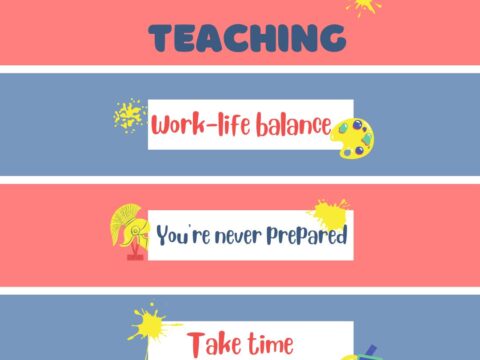This article from the Ask a Tech Teacher crew is for new teachers searching for what will be required of them as teachers, how to determine their style, the importance of a mentor, and more secrets to guide them in their new profession:
How to Choose Your Teaching Style and Level
It takes a certain kind of person to be a teacher. It’s one of the most noble professions you can choose, especially when you think about the powerful impact you can have on your students’ lives. However, before you get to that point, you need to decide which grade you want to teach and what kind of teacher you really want to be. Some people choose to work exclusively with younger children while others prefer to teach middle school students or in high schools. In this post, you’ll discover the different types of teaching approaches and decide which one matches most with your personal teaching style.
Teaching Requirements
Before getting into the types of teaching styles, you first need to earn your degree. Most teachers hold a master’s in education, so you’ll need at least four to five years to earn your degree. If paying for your education is an issue, you even consider asking your parents to cosign a loan. But what if they refuse because of their own financial problems? Since most young adults can have issues qualifying for loans on their own, it’s important to weigh the pros and cons of each type of financial options before choosing one. That said, there are different options to consider, so make sure you take time to research what they are and how repaying them can affect you.
Authoritarian
An authoritarian is someone who believes in having a strict classroom. They prefer their students to follow the rules without question. These kinds of teachers create a classroom environment that sets clear rules and boundaries. Most authoritarians, even though stricter, effectively engage with their students when they combine their teaching style with compassion.
Collaborator
Collaborative teachers are firm believers that teamwork is the hallmark of success. They thrive on creating settings that make their students want to collaborate and work together. They tailor lesson plans around group projects rather than autonomy. They also believe that students should guide each other with peer-to-peer instruction.
Mentor
Teachers who take the role of a mentor are far more than just a teacher. These kinds of teachers want their students to grow personally and academically as well. They use mentoring and coaching resources and are genuinely interested in all of their students’ well-being and may even take a more hands-on approach to help them succeed.
Innovator
If you’re someone who is always trying new things and loves to experiment with trending teaching methods, you are more of an innovator. You’re not afraid to try new ways of keeping your students interested in the classroom. You also ask for your students’ input about how they like to learn, and then use that information to create entertaining lesson plans.
Which Grade Should You Teach?
In addition to defining your teaching style, you also need to think about which grade you want to teach. From kindergarten to 12th grade, you can choose to teach one or more grades during your career. However, you need to be vested in the students and not be doing it just to do it. Say you love working with preteens but are offered a position teaching kindergarteners. You’re happy you were offered the job but aren’t really thrilled about working with smaller children. At this point, you need to decide whether you can effectively teach young children, or if it’s better to only take on the role as a temporary fill-in.
In terms of teaching younger children, you need to have a degree in childhood education, particularly working with children as young as four or five. You also need to have patience and a gentle demeanor to guide them throughout the day. When it comes to teaching middle school, you need to be an engaging, not to mention resilient, type of teacher. Preteens love to push boundaries, so working in middle schools is not for everyone. During these formative years, children can be moody and are more interested in socializing with friends than learning.
If you want to teach high school students, then you already know how stubborn some of them can be. Freshmen in high school are starting to transition into late teenage years whereas juniors and seniors are ready their high school career to be over. That said, having exceptional communication skills and a lot of patience are a must. But teaching in a high school setting isn’t all doom and gloom. Many times, working with older students gives you more freedom to hold engaging conversations in the classroom. You get to talk to them in a more adult-like fashion, which is a great way to make them feel respected and understood.
Copyright ©2023 askatechteacher.com – All rights reserved.
Jacqui Murray has been teaching K-18 technology for 30 years. She is the editor/author of over a hundred tech ed resources including a K-12 technology curriculum, K-8 keyboard curriculum, K-8 Digital Citizenship curriculum. She is an adjunct professor in tech ed, Master Teacher, webmaster for four blogs, an Amazon Vine Voice, CSTA presentation reviewer, freelance journalist on tech ed topics, and author of the tech thrillers, To Hunt a Sub and Twenty-four Days. You can find her resources at Structured Learning.






































Excellent article. I especially think it’s critical to find mentor teachers for all new teachers. Most teachers are glad to take colleagues under their wings, but a good administrator facilitates that happening.
I was surprised by the statement, “Most teachers hold a master’s degree in education.” I checked to see if that statement was true. It’s possible it is now because this data is from 2017-2018. It seems to be close to 50%. https://nces.ed.gov/surveys/ntps/tables/ntps1718_fltable04_t1s.asp
That mentor idea is critical–as you say. I didn’t have one when I started teaching, but I focused on tech ed and I think it scared everyone!
And I’m glad you commented on the Masters. It is surprising how many teachers have Masters (maybe not in Ed, though, here in the US).
Hope all goes well for you, Pete!